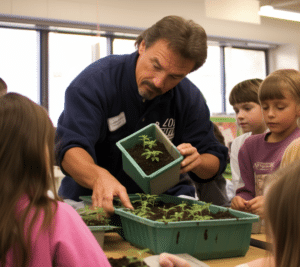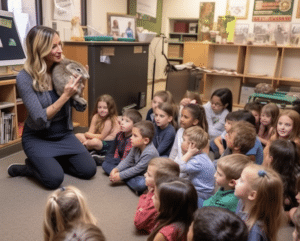Introduction – Farmer’s Day At School
Ever wondered where your food comes from or how your choices can help the planet? We’ve got something interesting for you. Dive into this article about Farmer’s Day at school – it’s more than just a fun day out.

We’re talking hands-on farming, learning about where our grub comes from, and seeing how choices, right down to our sturdy farm boots, can make a difference.
Whether you’re a student, parent, teacher, or community champ, get ready to roll up your sleeves and explore how we can make our world a bit greener, one seed at a time.
Farmer’s Day Is A Day For Honoring Farmers
So, you’re probably wondering, “What’s Farmer’s Day?” Let’s clear that up.
Farmer’s Day is a special day that we dedicate to honoring farmers and appreciating the hard work they put in to feed us all.
It’s all about bringing the community together, rolling up our sleeves, and getting a real taste of the farming life.
It’s celebrated in many places across the globe, but dates can vary.
In some countries, it’s a national holiday, while in others it’s more of a grassroots event.
It’s the perfect opportunity to explore local farms, learn about how our food is grown, and better understand the vital role of farmers in our everyday lives.
All in all, it’s a fantastic way to reconnect with nature and deepen our understanding of sustainable living.
So that’s Farmer’s Day in a nutshell – a celebration of all things farming and a tribute to those who make our meals possible.
Farmer’s Day In the US – When Is It
Farmer’s Day, often referred to as National Farmer’s Day, is celebrated across the United States on October 12th each year.
It is a day of honor observed by many to show appreciation to farmers and ranchers in all states for their significant contributions to society.
While it’s not an official national holiday, it is widely recognized and various states may have specific events, fairs, or educational activities to commemorate the day.
1. Ideas for Teachers and School Administrators
Planning Farmer’s Day at school indeed opens up a world of fascinating activities that not only engage students but also deepen their understanding of farming. Here are some ways teachers can enrich the event:
A. Seed Planting Session: This is an activity where students can get their hands dirty – literally! Organize a ‘seed planting’ session in the school garden or in small pots that the students can take home. This hands-on experience allows them to understand the growth process of plants. They can be taught about different types of seeds, how to plant them properly, and the care required for their growth. Teachers can facilitate a follow-up activity where students document the growth of their plants, encouraging continuous learning.
B. Farm to Table Workshop: Consider arranging a workshop that traces the journey of food from the farm to our plates. This could involve cooking a simple dish using vegetables and explaining how each ingredient is grown and harvested. This would provide a practical understanding of the importance of farming in our everyday lives.
C. Interactive Games and Quizzes: Design some interactive games revolving around farming methods. For example, a ‘guess the crop’ game where students identify crops from their leaves or seeds, or a quiz about different farming tools and machinery. These fun activities can serve as an engaging method to learn about farming.
D. Farmers as Guest Speakers: Inviting local farmers from the community to give practical demos and talks can greatly enhance the authenticity of the event. Farmers can share their day-to-day experiences, explain the importance of different seasons in farming, and discuss the challenges and rewards of their job. This can foster a deeper respect and appreciation for farmers among students.
E. Exhibition of Farming Tools and Equipment: Arrange an exhibition showcasing different farming tools and equipment. Explain their usage and importance in farming activities. This could be made interactive by having a guessing game or a ‘tool match’ where students match the tool to its function.
F. Sustainable Farming Presentation: Introduce students to the concept of sustainable farming and its importance in reducing carbon footprints. Discuss practices such as crop rotation, composting, organic farming, and use of renewable energy sources on farms. This could be presented in a kid-friendly way using videos, infographics, or even simple experiments.
G. Art and Craft Session: Incorporate an art and craft session related to farming. This could involve making farm animal puppets, painting farm landscapes, or crafting paper tractors. This allows students to engage their creativity while keeping the theme intact.
H. Farm-Themed Storytelling: Stories are a powerful tool for learning. Arrange a storytelling session featuring stories about farming and farmers. This could be followed by a discussion on the moral of the story, encouraging students to think and understand the life and work of farmers.
2. A Parent’s Guide to Farmer’s Day at School
For parents, understanding the essence of Farmer’s Day paves the way for a smooth and fruitful celebration.
From wearing farm-themed costumes to helping your ward understand farming basics, parents can play a huge role.
Encourage your child’s enthusiasm by reading them books like “The Vegetables We Eat.”
Equip them with Muck Boot Kid’s Hale Boots, designed for comfort and to withstand outdoor conditions.
Muck Boots: Hale Kids’
Muck Boots have a reputation for durability and comfort, making them a reliable choice for outdoor school activities such as Farmer’s Day.
The Hale Kids’ series, in particular, is known for its support and waterproof features, providing children with the perfect balance of protection and comfort.
3. A Student’s Perspective on Farmer’s Day
From the joy of planting their first seed to understanding the journey of their food, students benefit tremendously from Farmer’s Day.
It develops an appreciation for the farmer’s hard work, teaching them invaluable life lessons.
Mainly students get to enjoy all the activities put together by the other people around them!
4. The Role of Farmers on Farmer’s Day at School
Farmers are the heart and soul of Farmer’s Day.
Their hands-on engagement and personal farming stories provide an enriching experience for everyone involved.
During Farmer’s Day, farmers offer hands-on demonstrations, showing kids how to plant seeds, tend to crops, and maybe even how to care for farm animals.
These interactions allow students to develop a genuine understanding of the food’s journey from the soil to their plates.
Furthermore, farmers share their personal stories, shedding light on the challenges and rewards of farming life.
They give a face and a voice to the often-overlooked agricultural sector, highlighting the immense effort and dedication required to feed communities.
Focusing on Carbon Reduction and Sustainability
The celebration of Farmer’s Day is also an excellent platform to introduce children to the importance of sustainable farming practices.
Activities designed to understand the carbon footprint in farming and the value of organically cultivated produce can spark early awareness about reducing carbon emissions and adopting sustainable living practices.
Community Engagement on Farmer’s Day

Community participation not only cements the success of Farmer’s Day but also opens avenues for local farmers to showcase their work, products, and processes.
Communities can support by volunteering, participating, or even patronizing local farm stalls set up for the event.
Conclusion – Farmer’s Day At School
Farmer’s Day at school serves as a unique platform to recognize the efforts of farmers and understand our food’s journey from farm to plate.
By actively participating, we do more than just observe—we learn, appreciate, and develop a newfound respect for the world that feeds us.
So, whether you’re a student, a teacher, a parent, or a member of the community, get your farm boots ready—it’s time to mark Farmer’s Day on your calendar.
